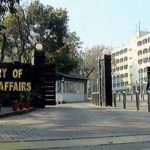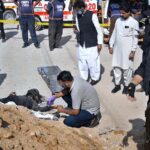UNITED NATIONS, Mar 13 (APP): In a phone call with Turkish President Recep Tayyip Erdogan, UN Secretary-General Antonio Guterres Sunday discussed various ongoing initiatives to end the Russia-Ukraine conflict, now in its third week, according to a UN spokesman.
Guterres “expressed his appreciation for President Erdogan’s mediation efforts between Russia and Ukraine,” the spokesman said in a statement issued in New York.
“They discussed the different ongoing initiatives to bring an end to the conflict, as peace is the most important goal,” he said.
The UN chief and President Erdogan also exchanged views on issues of nuclear security and the impact of the crisis on food and energy security in the world.
On Friday, UN political affairs chief Rosemary DiCarlo warned the UN Security Council that direct attacks against civilians and civilian objects are prohibited under international law, and may amount to war crimes.
In an urgent meeting, called by Russia to address its claims of United States support for military biological research in Ukraine, DiCarlo said Russian armed forces are pursuing laying siege to several cities in the south, east and north of the country, with a large concentration reportedly massed along several approaches to the capital, Kyiv.
The situation is particularly alarming in Mariupol, Kharkiv, Sumy and Chernihiv, she said, where shelling of residential areas and civilian infrastructure has resulted in an increasing number of civilians killed and injured.
“The utter devastation being visited on these cities is horrific,” she stressed.
As of 11 March, the UN High Commissioner for Human Rights (OHCHR) recorded 1,546 civilian casualties – including 564 killed and 982 injured – since the start of the Russian invasion.
The real casualty figures are likely “considerably higher”. Most have been caused by explosive weapons with a wide impact area, including heavy artillery, multi-launch rocket systems and air strikes.
Further, she said OHCHR has received credible reports of Russian forces using cluster munitions in populated areas – indiscriminate attacks, which are prohibited under international humanitarian law.
As of 10 March, the World Health Organization (WHO) verified 26 attacks on health facilities, health workers and ambulances, causing 12 deaths and 34 injuries. This includes the bombing of the Mariupol maternity hospital on 9 March, which she condemned.
DiCarlo went on to describe the targeting of civilians, residential buildings, hospitals, schools and kindergartens as “inexcusable and intolerable”, emphasizing that all alleged violations of international humanitarian law must be investigated, and perpetrators held accountable.
DiCarlo said humanitarian aid is being scaled up in areas where security permits and has reached more than 500,000 people. The UN and partners have developed operational plans to meet humanitarian needs where they are most acute, she said, appealing to donors who pledged over $1.5 billion to the appeal last week, to release the funding quickly. It is critical to achieve a ceasefire to allow for the safe passage of civilians from besieged areas, she told the 15-member Council.
The number of refugees fleeing the violence has reached 2.6 million – all of whom, including third country nationals, need access to safety and protection, in line with the principle of non-refoulement, and without discrimination.
“The need for negotiations to stop the war in Ukraine could not be more urgent”, she said, noting that three rounds of talks held thus far between Ukrainian and Russian delegations must be intensified – notably to secure humanitarian and ceasefire arrangements as a matter of priority. “The logic of dialogue and diplomacy must prevail over the logic of war.”
Perhaps most alarming are the risks the violence poses to the global framework for peace and security, she said, adding that: “We must do everything we can to find a solution and put an end to this war; we must do it now.”
The meeting meeting came on the heels of claims by Russian Ministry of Defence Spokesperson Major General Igor Konashenkov on 6 March, his country’s military had uncovered evidence of US-funded military biological programmes in Ukraine, including documents confirming the development of “biological weapons components”.
Addressing those concerns, High Representative for Disarmament Affairs, Izumi Nakamitsu, said the “United Nations is not aware of any biological weapons programmes”.
Nor is it in a position to confirm or deny” reports that public health facilities are in areas impacted by armed conflict, placing the safety of those facilities at risk. She appealed to all parties in the conflict to ensure the safety of all such facilities in Ukraine.
Explaining that the Russian Federation and Ukraine are both States parties to the 1972 Biological Weapons Convention – which prohibits their development, production, acquisition, transfer, stockpiling and use – and that Moscow is a depositary Government, she said biological weapons have been outlawed since the Convention entered into force in 1975.
With 183 States parties to the treaty, biological weapons are “universally seen as being abhorrent and illegitimate,” she stressed.






